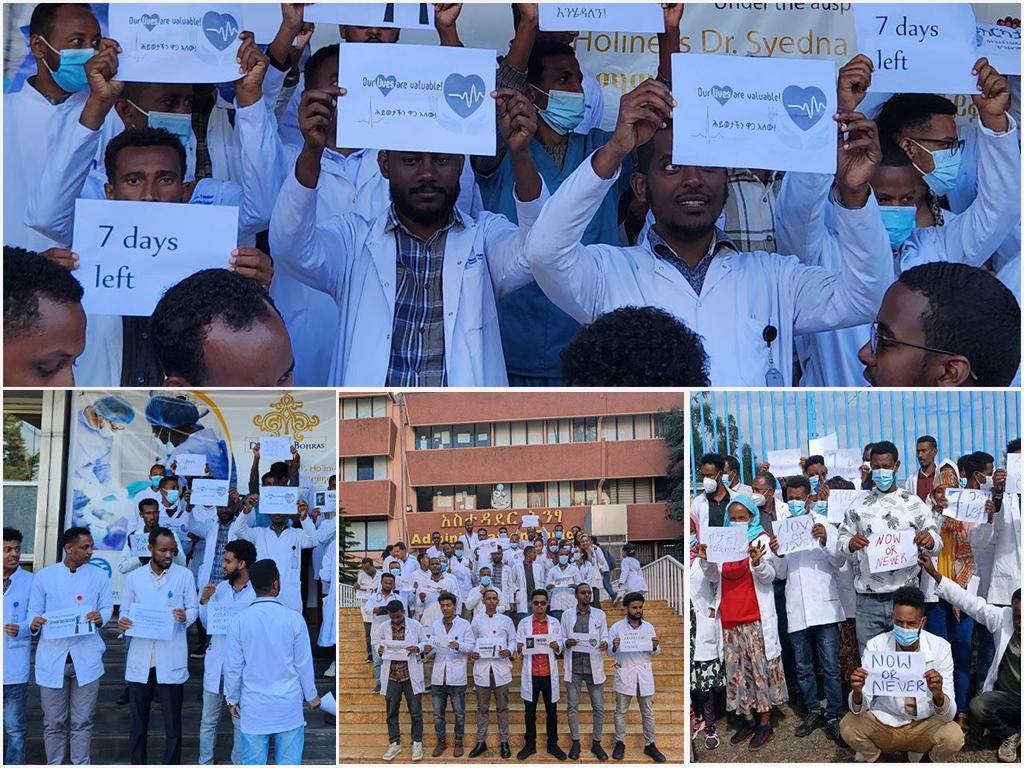
Africa-Press – Ethiopia. May 6, 2025 2 minutes read Addis Abeba– At least eight displaced individuals have reportedly died from hunger and lack of medical care over the past three months in internally displaced persons (IDP) centers in Axum town, Tigray region, as humanitarian conditions continue to deteriorate amid ongoing suspension of aid.
Kahsay Asayehegn, coordinator for displaced persons in the Axum Cluster of the Western Tigray Zone, told Tigray TV that the deceased succumbed to “hunger” and “lack of medicine,” while others are now exposed to “cold, illness, and the risk of flooding” as heavy rainfall persists in the area.
According to Kahsay, the displaced communities have appealed to authorities “to save them from the risk of death” linked to the prolonged interruption of aid. He added that they are requesting the government to facilitate their return home and, in the meantime, to provide “secure shelter, at least until the rainy season ends.”
Similarly, Deutsche Welle (DW) reported a worsening situation in the Amhara region following the suspension of humanitarian assistance by USAID. The broadcaster cited displaced individuals who said they have been left without access to basic supplies.“There is no food,” one person said, adding that “shelter tents have collapsed, medical professionals have left, and we no longer receive flour, oil or clothing.”
Mihret Melaku, head of the Waghimra Zone Food Security and Disaster Prevention Office, stated that residents of rain-deficient areas who had previously relied on aid are now struggling. “The challenge extends beyond displaced people,” he said, “to include others who had been receiving monthly support.”
In response to growing needs, Tesfaw Batabl, Commissioner of the Amhara Disaster Prevention and Food Security Commission, told DW that the regional government has mobilized resources to help close the gap. “We have collected one billion Birr for grain purchases,” he said, adding that over 46,000 quintals of grain have been gathered.He also noted that officials plan to send food to areas experiencing shortages and to address concerns related to health services and shelter infrastructure.
The suspension of USAID funding—enacted under an executive order by U.S. President Donald Trump—has disrupted humanitarian operations across Ethiopia, including food distribution, healthcare, and refugee assistance. Aid agencies have warned that the freeze is worsening an already critical humanitarian situation.
In 2023, Ethiopia was the largest recipient of American aid in sub-Saharan Africa, receiving over $1 billion, most of which was allocated to emergency food support and health services.
Ahmed Hussein, President of the Ethiopian Civil Society Organizations Council, previously told Addis Standard that the freeze was “abrupt” and warned that some organizations are “predominantly or entirely” dependent on USAID support, making them especially vulnerable. A senior manager at a civil society organization, who requested anonymity, said the halt would “affect urgent life-saving activities,” disrupt salaries, and suspend ongoing projects.
Amid these mounting challenges, the United Nations World Food Programme (WFP) has also announced a forced suspension of its nutrition treatment programs for 650,000 malnourished women and children starting in May, citing what it described as a “devastating” funding shortfall. “WFP is being forced to halt treatment for 650,000 malnourished women and children in May due to insufficient funding,” the agency said, noting that it had originally planned to reach two million mothers and children with life-saving nutrition support this year.
For More News And Analysis About Ethiopia Follow Africa-Press





